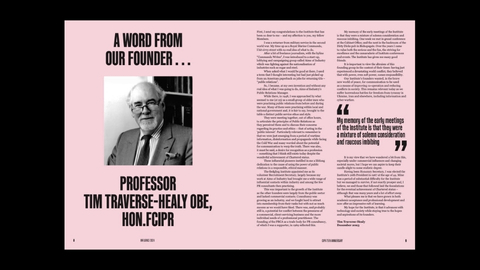Tim Traverse-Healy: a personal tribute to the CIPR founding member
A former CIPR president remembers the kindness and generosity of Tim Traverse-Healy, a founding member of the institute, who died in May at the age of 102.
It was my great privilege to serve the CIPR as President in 2015; and on the announcement of my election, I received a piece of post from Tim Traverse-Healy Hon FCIPR [Honorary fellow of the CIPR].
It is not an understatement to say that simple act of friendship and kindness changed my life. The letter was an invitation to lunch, once a quarter, in Bath, throughout my presidency. A quiet meeting where I could confidently ask Tim’s advice and insights into pretty much anything.
I came to treasure our time together so much that, after my tenure ended, we continued to meet whenever we could.
Onlookers may have thought I was a relative, such was his kindness and generosity to me. Being president is a great joy but it also brings challenges and at times a sense of isolation, as does any leadership role and Tim’s wisdom and intellect helped make some tricky times bearable.
He taught me about leadership and reminded me so much of my beloved maternal grandfather, treating everyone he met with the same degree of respect; he reminded me that the issues I frequently faced had been faced before; to listen to our members (but not be put off course by the inevitable negativity from a few); and to honour the origins of the Institute. He also encouraged me to keep the support going, “pass it on” I guess we would say now, and I hope that is something I continue to do.
He also made me laugh, so much, and often very loudly. Once I recall I was in such hysterics, with tears rolling down my face, he had to lend me his handkerchief. His anecdotes were extraordinary.
Many important things have been said and written about him; and many more will be written in the future. This is a small contribution from me, one that I write with great love and thanks to him, and to Kevin his son (also a past president) who continues to show me kindness and friendship.
I knew one day Tim would no longer be with us but once that day arrived I was deeply moved and saddened, not just for the extraordinary intellect, sharp wit and trailblazing man we have lost but for someone who was just so extraordinarily kind.
I maintain that kindness is a superpower and Tim, you wore your cape lightly.

Sarah Pinch is the managing director of Pinch Point Communications. A fellow of the CIPR, Sarah served as the institute's president in 2015.
Simon Harris's tribute to Tim Traverse-Healy: Welcoming, supportive, wise and loyal
Tim Traverse-Healy's contribution to Influence magazine
In early 2024, as part of the institute's 75th anniversary celebrations, CIPR members received a commemorative printed edition of Influence. It included a full-page letter from Tim Traverse-Healy to members, titled A Word From Our Founder, which we are republishing below.

First, I send my congratulations to the Institute that has been so dear to me – and my affection to you, my fellow members.
I was a returner from military service in the second world war. My time up as a Royal Marine Commando, I hit civvy street with no real idea of what to do.
After a bit of freelance journalism, with the byline “Commando Writes”, I was introduced to a start-up, lobbying and campaigning group called Aims of Industry which was fighting against the nationalisation of industries such as sugar and steel.
When asked what I would be good at there, I used a term that I thought interesting but had just picked up from an American paperback on jobs for returning GIs – “public relations”.
So, I became, at my own invention and without any real idea of what I was going to do, Aims of Industry’s Public Relations Manager.
While there, in 1948, I was approached by what seemed to me (at 25) as a small group of older men who were practising public relations from before and during the war. Many of them were practising within local and national government and, it is fair to say, brought to the table a distinct public service ethos and style.
They were meeting together, out of office hours, to articulate the principles of Public Relations as they perceived them and to discuss their concerns regarding its practice and ethics – that of acting in the ‘public interest’.

Particularly relevant to remember is that we were just emerging from a period of wartime information, disinformation and propaganda while facing the Cold War and many worried about the potential for communication to warp the truth. There was also, it must be said, a desire for recognition as a profession – something that I think still exists today despite the wonderful achievement of Chartered status.
These influential pioneers instilled in me a lifelong dedication to the cause of using the power of public relations in a responsible, ethical manner.
The fledgling Institute appointed me as its volunteer Recruitment Secretary, largely because my work at Aims of Industry had brought me a wide range of influential contacts within industry and among the few PR consultants then practising.
This was important to the growth of the Institute as the other founders were largely from the public sector and lacked commercial contacts. Consultancy was growing as an industry, and we fought hard to attract into membership from their ranks but with not as much success as we would have liked. There was, and probably still is, a potential for conflict between the pressures of a commercial, client-servicing business and the more individual needs of a professional practitioner. The founding of the PRCA as a trade body for PR consultancy, of which I was a supporter, in 1969 reflected this.
My memory of the early meetings of the Institute is that they were a mixture of solemn consideration and raucous imbibing. One week we met in grand conference at the Cabinet Office; and the next in the backroom of the Dirty Dicks pub in Bishopsgate. Over the years I came to value both the serious and the fun, the striving for excellence and the camaraderie of Institute conferences and events. The Institute has given me many good friends.
It is important to view the altruism of this founding group in the context of their times: having just experienced a devastating world conflict, they believed that with power, even soft power, comes responsibility.
Our Institute’s founders wanted, in the brave new world of peace, for communication to be used
as a means of improving co-operation and reducing conflicts in society. This remains relevant today as we suffer horrendous battles for freedom from tyranny in Ukraine, Iran and elsewhere, including information and cyber warfare.
It is my view that we have wandered a bit from this, especially under commercial influences and changing societal mores, but I hope we can aspire to keep their candle alight to some realistic degree.
Having been Honorary Secretary, I was elected the Institute’s 20th President in 1967 at the age of 44. Mine was a period of substantial difficulty for the Institute but we managed to survive, if not exactly prosper and, I believe, we and those that followed laid the foundations for the eventual achievement of Chartered status – although that was many years and a lot of effort away.
What pleases me is that we have grown in both academic acceptance and professional development and now offer an impressive raft of learning.
My hope for the Institute, is that it advances with technology and society while staying true to the hopes and aspirations of its founders.
Tim Traverse-Healy
December 2023
.jpg&w=728&h=90&maxW=&maxH=&zc=1)
